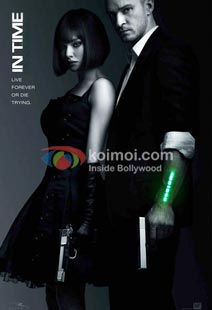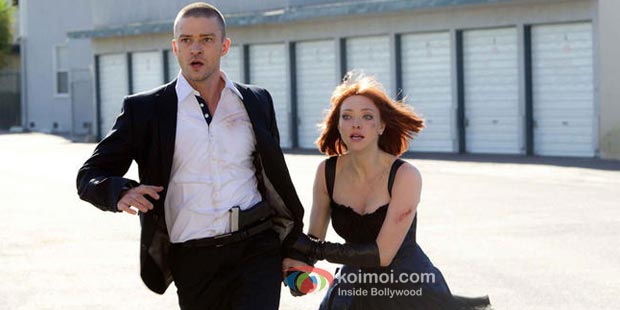
Cast: Justin Timberlake, Amanda Seyfried, Olivia Wilde, Matt Bomer, Alex Pettyfer, Cillian Murphy, Vincent Kartheiser.
What’s Good: The premise of the story; Justin Timberlake’s performance.
What’s Bad: The routine script; the boring first half; the unanswered questions that arise in the audience’s minds; the lack of action scenes.
Verdict: In Time is an average fare that will fail to do much at the Indian box-office.
Loo break: A couple
Watch or not?: In Time is mostly a waste of time, unless you have got a lot of it.
New Regency and Strike Entertainment’s In Time is a science-fiction film about an era when time is money – literally.
Sometime in the future, or in a parallel world, humans have been genetically modified to live only up to 25 years of age, after which they will die if they cannot earn, beg, or steal more time. As time is the only currency, poor people live day-to-day, with Day-glow clocks on their hands that indicate how much time they have left to die. Banks lend time; the minute-men (thieves) steal it and the timekeepers (cops) maintain the balance of time between various time zones. People transfer time among each other by shaking hands and interfacing their forearms. On the flip side, ageing stops at 25 and no matter how long you live – even hundreds of years – you still look as you did when you were 25.
Will Salas (Justin Timberlake) is one of the unfortunate men in the poor time zone where, prices are rising (one coffee costs 2 hours!) all the time so that the poor remain poor. One day, he saves a rich man, Henry Hamilton (Matt Bomer), from thieves. The next day, Will wakes up to find that Henry Hamilton has transferred almost a hundred years to him and that he (Henry) was committing suicide. In a failed attempt to save Henry, Will is captured on a security camera.
With all the time he could want, Will rejoices and gives some away to his friend. However, he is unable to save his mother (Olivia Wilde), who dies just moments before Will can give her a new lease of life. Will then crosses time zones to reach the land of the time-rich and gambles with the richest man, Philippe Weis (Vincent Kartheiser), to add many more years to his clock. He also makes acquaintance with Weis’ stunning daughter, Sylvia (Amanda Seyfried), whom he takes hostage when the timekeepers, led by Raymond Leon (Cillian Murphy), arrive to arrest Will for the murder of Henry Hamilton.
From here on, Will and Sylvia are on the run from the law. For some time, it seems that Will has kidnapped Sylvia, but before long, Sylvia starts loving the freedom of living minute-to-minute and teams up with Will in an attempt to steal and redistribute time to the poor. However, Leon, the tenacious cop, does not give up on chasing the duo. What happens then? Are Will and Sylvia able to turn the clock? Or do they run out of time?
In Time Review: Script Analysis
Andrew Niccol’s story is based on an interesting premise but is, otherwise, quite a usual tale about an underdog taking on the system. The screenplay, also written by Niccol, is rather slow in the first half when the audience is treated to repetitive shots of a world where everybody keeps talking about time all the time. These parts are rather boring. However, the narrative picks up steam in the second half when Will and Sylvia take off into the poor time zone and are chased by the timekeepers. There are, unfortunately, very few action scenes and many illogical events that raise questions in the viewers’ minds. If the film is set in the future, or in such a technologically advanced world where humans can be genetically modified, why don’t the characters in the film have mobile phones (forcing them, in effect, to use public phones, where they can be easily spotted by the cops)? Also, how is time tapped into small cassette-like structures? Why does a time-bank in the ghetto, which must be so sensitive to attacks, not have a single armed guard? All these and many more questions go unanswered as the writer-director concentrates on telling the story of Will’s character and his attempt at creating a more equitable society. The climax is predictable. The dialogues are commonplace and unintentionally funny at times.
At some level, the film also seems like an allegory for the inequity caused by the capitalist economy and the inflationary monetary system, but any such attempt is more suited to a book than a movie. All in all, the script intrigues the audience and whets their appetite but there is precious little to be cherished
In Time Review: Performances & Direction
Justin Timberlake does very well in a role that actually requires very little. Amanda Seyfried looks beautiful and serves as eye-candy. Cillian Murphy is effective. Olivia Wilde, Matt Bomer, Alex Pettyfer (as the minute-man) and Johnny Galecki (as Will’s friend) do well in their short roles. Vincent Kartheiser stands out as the rich man.
Andrew Niccol’s direction is alright for the kind of script he has written. However, by not explaining several things in the film, he takes away from the impact of the story. The Indian audience especially will not be too happy about a lot of things remaining unexplained. Craig Armstrong’s background score sets the mood for the film, especially in the latter half. Cinematography, by Roger Deakins, succeeds in creating a world that seems distant. Zach Staenberg’s editing is fair..
In Time Review: The Last Word
On the whole, In Time is a half-baked attempt at science-fiction, at best. It will fail to do much at the Indian box-office.
In Time Trailer
In Time released in India on November 4, 2011.



 Follow Us
Follow Us








